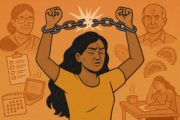While most of us are familiar with the term Post-Traumatic Stress Disorder (PTSD), we are completely unaware of Complex Post-Traumatic Stress Disorder (C-PTSD). Let’s explore the causes, symptoms, and treatments of this little-known disorder.
Do you want to stop existing and start living? My new book, A Deeper Wellness, can help you do just that. Through its 18 chapters and challenging, self-reflective exercises, you’ll learn how to heal your past, deal with the problems that you’re struggling with today, and begin to build the future you want and deserve. Order your copy of A Deeper Wellness on amazon.com or amazon.ca And now … https://www.book.adeeperwellness.com.
Dr. Monica Vermani is a Clinical Psychologist specializing in treating trauma, stress and mood & anxiety disorders, and the founder of Start Living Corporate Wellness. She is a well-known speaker, columnist and advocate in the field of mental health and wellness. Her new book, A Deeper Wellness, is now available for purchase at https://www.book.adeeperwellness.com, and her in-depth online self-help program, A Deeper Wellness, offers powerful mental health guidance, life skills, knowledge and healing, anywhere, anytime. https://www.adeeperwellness.com/ https://www.drmonicavermani.com/
To understand Complex PTSD, it is crucial to understand PTSD, and its symptoms and causes. PTSD begins with a traumatic experience or an exposure to actual or threatened sudden death, serious injury, violent assault, or sexual violence. It could also involve a serious injury or the sudden, unexpected death of a loved one. PTSD can also occur after witnessing first-hand or experiencing a traumatic, life-threatening event, like a natural disaster, serious car accident like an automobile or plane crash, physical or sexual assault, combat or war-zone exposure.

While PTSD is linked to a single event or experience, or a cluster of related events, Complex PTSD pertains to longer-term exposure to a traumatic situation. Complex PTSD involves prolonged, repeated experiences — often in childhood — of emotional, physical or sexual abuse, domestic violence, or neglect. Prolonged exposure to traumatic situations later in life, like being a victim of human trafficking, living in a war zone with no hope of escape, or being a victim of torture, are also linked to Complex PTSD.
Common Symptoms
As with PTSD sufferers, those who suffer from Complex PTSD may be plagued with intrusive and upsetting memories and/or dreams. They may experience flashbacks, and feel at times that they are in life-threatening danger. They may suffer momentary or prolonged distress when exposed to a trigger — that is to say a reminder — of their trauma. Even subtle triggers —like a sound, a smell, a sight that reminds them of some element of their traumatic event — might set off distressing psychological reactions. They may have great difficulty concentrating and sleeping. They feel isolated, alone, and unsafe in the world.
Prolonged Trauma
Unlike PTSD, which is linked to a single event or cluster of events, Complex PTSD sufferers also struggle with strong negative views of themselves. They often harbor a deep sense of shame and blame themselves for what they have been through. They often protect the person who abused or neglected them, particularly when that person was responsible for their care at an early age. They feel helpless and unable to make their way in the world. Complex PTSD is often interpersonal in nature, and as a result, sufferers may struggle to establish healthy relationships, due to their prior exposure to unhealthy relationships and an inability to control negative emotions. They may deeply mistrust others and avoid relationships altogether. They struggle with feelings of deep despair and feel isolated and helpless. They often abuse alcohol or drugs.
Complex PTSD vs Borderline Personality Disorder
Complex PTSD is a relatively new diagnosis, with many symptoms in common with Borderline Personality Disorder. What sets Complex PTSD apart from Borderline Personality Disorder is a history of prolonged abuse and a strong and unchanging negative view of the self. Additionally, while people suffering from Complex PTSD are at risk of self-harm, those suffering from Borderline Personality Disorder are at far greater risk of self-harm and suicide.
The Effect Of Trauma On The Brain
Traumatic or distressing experiences can change the way the brain responds to threats. Trauma essentially shuts down the neuropathways between the amygdala — the part of the brain that harbors trauma but is unable to process it — and the part of the brain that can process it. When this happens, victims of trauma can remain stuck and unable to process and recover from a distressing event or series of events. This leaves those struggling in the aftermath of trauma stuck in a hopeless cycle, unable to move beyond their experiences. While recovery from Complex PTSD can take significant time, attention, and effort, there are effective treatments available.

Effective Treatments
As with any mental health condition, the ability to recognize symptoms is the first step to finding help. The good news is that there are highly effective treatments available, and if you, or someone close to you, suffers from PTSD, there is no time like the present to begin to heal and create a healthier, happier future.
Treatments for PTSD include Cognitive Behavioral Therapy (CBT), and Dialectical Behavioral Therapy (DBT). A tremendously effective form of therapy for sufferers of Complex PTSD is Eye Movement Desensitization and Reprocessing (EMDR). EMDR opens neuropath ways between the part of the brain that is unable to process trauma and the part of the brain that can do so. EMDR is proven to greatly relieve, reduce or remove psychological stress.
Beyond Our Negative Experiences
As a clinical psychologist specializing in treating trauma, I know that we are more than our negative experiences and that when we process our past hurts, we can move beyond our pain and suffering and live a full and happier life. We can stop merely existing, and start living.
Dr. Monica Vermani’s tips if you believe that you may be struggling with Complex PTSD:
- Confiding in a trusted friend who can support you while you connect with the resources you need.
- Talking to your doctor or a primary care physician.
- Exploring online Complex PTSD resources, like: https://www.complextrauma.ca/ and https://cptsdfoundation.org/cptsd-resources/
- Seeking help from your insurance provider if you are an employee with an EAP
Main Image Photo Credit: www.pexels.com
Dr. Monica Vermani
Author
Dr. Monica Vermani is a Clinical Psychologist who specializes in treating trauma, stress, mood & anxiety disorders and is the founder of Start Living Corporate Wellness. Her book, A Deeper Wellness, is coming out in 2021. www.drmonicavermani.com


















































































































